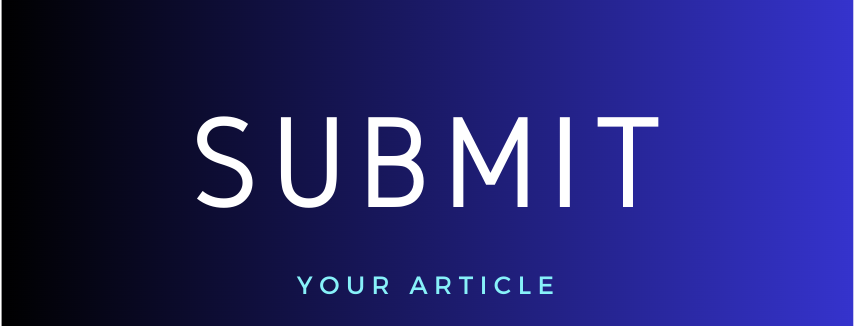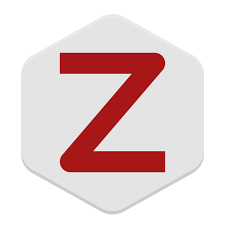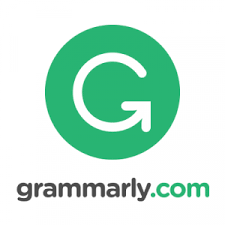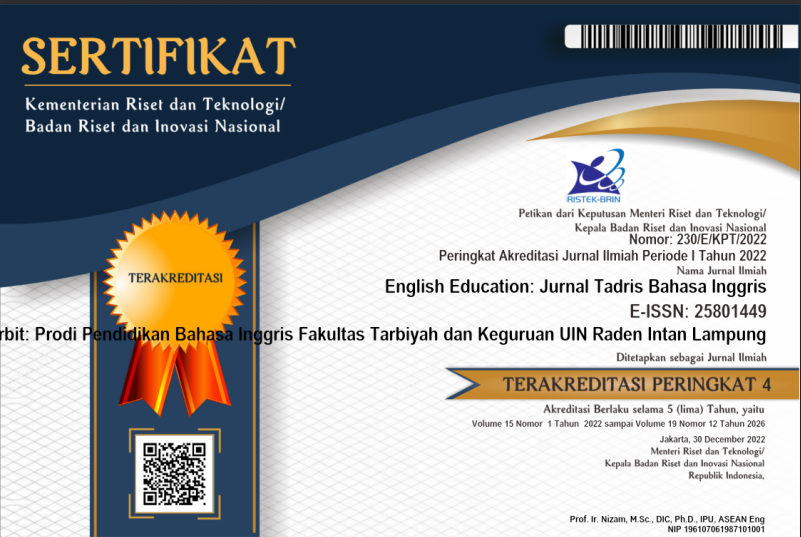Blended Method: Online-Offline Teaching And Learning, On Students’ Reading Achievement
Abstract
Full Text:
PDFReferences
Academic Partnerships. (2012). A Guide to Quality in Online Learning. California: Creative Commons.
Bakia, Shear, Toyama, & Lasseter. (2012). Understanding the Implications of Online Learning for Educational Productivity. Washington: U.S. Department of Education.
Jaben & Thomas. (2015). Effectiveness of Online Language Learning. Proceedings of the World Congress on Engineering and Computer Science 2015. Vol I, WCECS 2015, October 21-23, 2015, San Francisco, USA
Jaggars & Bailey. (2010). Effectiveness of Fully Online Courses for College Students: Response to a Department of Education Meta-Analysis. Community College Research Center. Teachers College, Columbia University.
Epignosis LLC. (2014). E-Learning: Concepts, Trends, Applications. California: Epignosis LLC.
Keng. (2018). Comparing the Cultural Dimensions and Learners’ Perceived Effectiveness of Online Learning Systems (OLS) among American and Malaysian Learners. International Journal of Computer Science & Information Technology (IJCSIT), Vol. 10, No. 1.
Lack. (2013). Current Status of Research on Online Learning in Postsecondary Education. United States: ITHAKA S+R.
Mansour & Mupinga. (2007). Students’ Positive and Negative Experiences in Hybrid and Online Classes. Coll Stud. Vol. 41, No. 1.
Matsunaga. (2016). College Students’ Perceptions of Online Learning: Knowledge Gain and Course Effectiveness. The Online Journal of Distance Education and e-Learning. Vol.4, Issue 2.
Means, Toyama, Murphy, & Bakia. (2013). The Effectiveness of Online and Blended Learning: A Meta-Analysis of the Empirical Literature. Teachers College Record, Vol. 115, 030303.
Means, Toyama, Murphy, Bakia, & Jones. (2010). Evaluation of Evidence-Based Practices in Online Learning: A Meta-Analysis and Review of Online Learning Studies. Washington: U.S. Department of Education.
Nguyen. (2015). The Effectiveness of Online Learning: Beyond No Significant Difference and Future Horizons. MERLOT Journal of Online Learning and Teaching. Vol. 11, No. 2.
Ni. (2013). Comparing the Effectiveness of Classroom and Online Learning: Teaching Research Methods. Journal of Public Affairs Education, Vol. 19 (2), 199-215.
Patrick & Powell. (2009). A Summary of Research on the Effectiveness of K-12 Online Learning. iNACOL. June 2009.
Sun, A., & Chen, X. (2016). Online education and its effective practice: A research review. Journal of Infor-mation Technology Education: Research, 15, 157-190. Retrieved from http://www.informingscience.org/Publications/3502
Swan, K. (2003). Learning effectiveness: what the research tells us. In J. Bourne & J. C. Moore (Eds) Elements of Quality Online Education, Practice and Direction. Needham, MA: Sloan Center for Online Education, 13-45.
UMass Faculty. (2003). Teaching and Learning Online: Communication, Community, and Assessment. Massachusetts: Massachusetts University.
Xu & Jaggars. (2013). Examining the Effectiveness of Online Learning within a Community College System: An Instrumental Variable Approach. Community College Research Center. Teachers College, Columbia University.
DOI: http://dx.doi.org/10.24042/ee-jtbi.v12i1.4432
English Education: Jurnal Tadris Bahasa Inggris, UIN Raden Intan Lampung is licensed under a Creative Commons Attribution-ShareAlike 4.0 International License. pISSN: 2083-6003, eISSN: 2580-1449.









